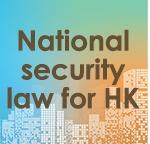Hong Kong’s No 2 official and other political heavyweights have called on the international community to give a fair assessment of the city’s National Security Law, more than two and a half months after its smooth implementation.
The Law of the People’s Republic of China on Safeguarding National Security in the Hong Kong Special Administrative Region was adopted by China’s top legislature and promulgated in the HKSAR on June 30.
Addressing the 45th session of the United Nations Human Rights Council in Geneva on Wednesday by video, Chief Secretary for Administration Matthew Cheung Kin-chung said the new law has been effective in restoring stability.
Since the law came into effect, advocacies of “Hong Kong independence” and collusions with external forces have visibly subsided, as have acts of violence and blatant defiance of law and order, Cheung said.
Since the law came into effect, advocacies of “Hong Kong independence” and collusions with external forces have visibly subsided, as have acts of violence and blatant defiance of law and order, Chief Secretary for Administration Matthew Cheung Kin-chung said
“The national security law is designed to bolster the successful ‘one country, two systems’ principle, which will continue to drive Hong Kong’s progress. It seeks to preserve Hong Kong’s core values, including rights and freedoms, the rule of law and judicial independence,” Cheung said.
ALSO READ: Chief secretary: HK always strives to safeguard rule of law
Cheung said that it is unthinkable that a law designed to safeguard national security in the HKSAR should be a cause for concern for some countries, saying that almost all countries have their own national security laws. “The international community should be fair and not adopt a double standard,” he said.
Ronny Tong Ka-wah, senior counsel and executive councilor in Hong Kong, agreed. He said that the way some foreign politicians perceive the city’s National Security Law is absolutely unjust and unfair.
“I noticed some had accused the legislation as (being) ambiguous, but compared to the national security legislation in the United States, the wordings used in the articles of SAR’s National Security Law is already very precise and in line with common law jurisdictions’ requirements,” Tong said.
Tong cited the Treason Clause contained in the US Constitution, which uses vague language such as “adhering to their enemies, giving them aid and comfort”.
He said at least obscure terms such as “comfort” are not written in Hong Kong’s National Security Law.
Elizabeth Quat, a lawmaker with the Democratic Alliance for the Betterment and Progress of Hong Kong,, said residents have seen changes for the better since the new law came into effect. Black-clad rioters are not as rampant as last year, and Hong Kong is more peaceful, with no traffic disruptions, roadblocks, flying bricks or fires on the road, she said.
READ MORE: Advisers to CE: Security law has restored stability in HK
The reality speaks for itself, Quat added. “Now we can all see the National Security Law does not suppress freedom of speech in Hong Kong. No one is jailed for simply making a speech, and residents still have the right to criticize the policies whenever they like,” she said.
Lau Siu-kai, vice-president of the Chinese Association of Hong Kong and Macao Studies, also urged the international community to take an unprejudiced view of the SAR’s National Security Law.
“Every country in the world has their own national security legislation, and their goals are no different, which is to curb activities which endanger national security,” Lau said. “So they are in no place to criticize the central and SAR government.”
Lau said Hong Kong has always had the responsibility of safeguarding national security under the Basic Law. With the law implemented in the city now, it has not only further strengthened the “one country, two systems” principle and restored the city’s law and order, the economy can be revitalized only when investors feel more confident to invest here, he said.



